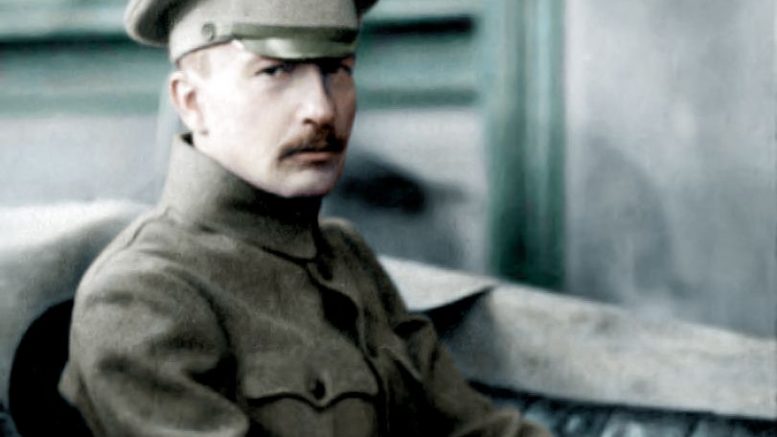While there have been countless books and articles about V.I. Lenin, whose death in 1924 has been marked in this newspaper and elsewhere, there are some Russian revolutionaries of that time who have long been forgotten.
The largest group of non-Bolshevik socialists was never the Mensheviks. It was the Party of Socialist Revolutionaries (PSR) — a party so large and popular that it won the greatest number of votes in the only free and fair election Russia ever held, in 1917. It would have dominated the Constituent Assembly and possibly changed the course of the revolution, had that assembly been allowed to meet in January 1918. Instead it was dispersed by Bolshevik soldiers. The PSR began its long and painful decline as the party was outlawed and their leaders arrested and often killed by the Cheka, the Soviet secret police.
Boris Savinkov, who was murdered by the Bolsheviks ninety-nine years ago next month, is one of many PSR leaders forgotten by history. But at one time, he was a living legend.
A leading figure in the Combat Organisation of the party, he was in charge of a number of ambitious attempts to decapitate the tsarist regime through terror. Though he was not personally involved in the actual throwing of bombs, he was the mastermind of the PSR’s campaign of terror. Among those killed by PSR fighters under his command were the Interior Minister, Plehve, and the tsar’s uncle, the Grand Duke Sergei. The tsar too was on Savinkov’s hit list.
Savinkov worked as the deputy to Ievno Azef, who in addition to being a ruthless terrorist had also served for many years as a paid agent of the tsarist Department of Police, the Okhrana. When Azef was exposed as a spy, Savinkov took over the organisation.
In addition to being an underground warrior for the PSR, Savinkov had an artistic bent. He was a novelist with at least three novels under his belt. They are all autobiographical, covering the various periods of his life. They are all out of print.
In 1917, Savinkov, was delighted by the overthrow of the tsar and welcomed the creation of the Provisional Government. Unlike many socialists, among them the Bolsheviks, but also Mensheviks like Julius Martov, Savinkov supported the Russian involvement in the First World War. He was joined in this view by the founding father of Russian Marxism, Georgi Plekhanov and the Georgian Social Democrat Irakli Tsereteli. Like Tsereteli, he became a member of Kerensky’s government, serving as deputy minister of war. And also like Tsereteli, we was — controversially — a supporter of the restoration of capital punishment for soldiers who deserted or refused to fight.
With the Bolshevik seizure of power in November 1917, Savinkov found himself searching for a new political home, somewhere he could play a leading role in the fight against Lenin and his party. He was initially involved with fellow members of the PSR and other socialist groups, but later found himself working with the various White generals, including Denikin, and Admiral Kolchak. Savinkov knew that these men did not share his views, that they were reactionary, antisemitic monarchists. But they were the only army on Russian soil that was standing up against the Soviet regime.
With the Red Army victory in the Civil War, Savinkov had run out of ideas. He could not bring himself to support the new Soviet regime, nor did he feel comfortable among the White Russian exiles. He was always looking for a way back into the fight.
When he learned of a new underground organisation in Russia that seemed ready to take the fight to the Bolsheviks, he jumped at the chance to join in. That organisation was known as The Trust and was set up by the Cheka to lure anti-Bolsheviks back to the country. Savinkov walked right into their trap. He was arrested and during his trial, he recanted his views and acknowledged Bolshevik rule. He was sentenced to death, but that sentence was commuted by the Soviet leadership to ten years in prison.
But for Savinkov, it was the end of the road. In May 1925, he died after being thrown out of a window of the Lubyanka, headquarters of the Cheka in Moscow.
Savinkov’s legacy is a complex one. He showed real courage in his various fights against autocracy, tsarist and Soviet. But he also made many mistakes — and many enemies. The books he left behind paint an extraordinary picture of life among the revolutionaries in the final years of the tsarist regime.
A year from now, it will therefore be the 100th anniversary of the death of a man who was once the most feared terrorist in Russia. But history has forgotten Savinkov, and it is unlikely that the occasion will be marked anywhere — least of all in Putin’s Russia, a country where the Cheka is still formally admired and revered.
This column appears in this week’s issue of Solidarity.
